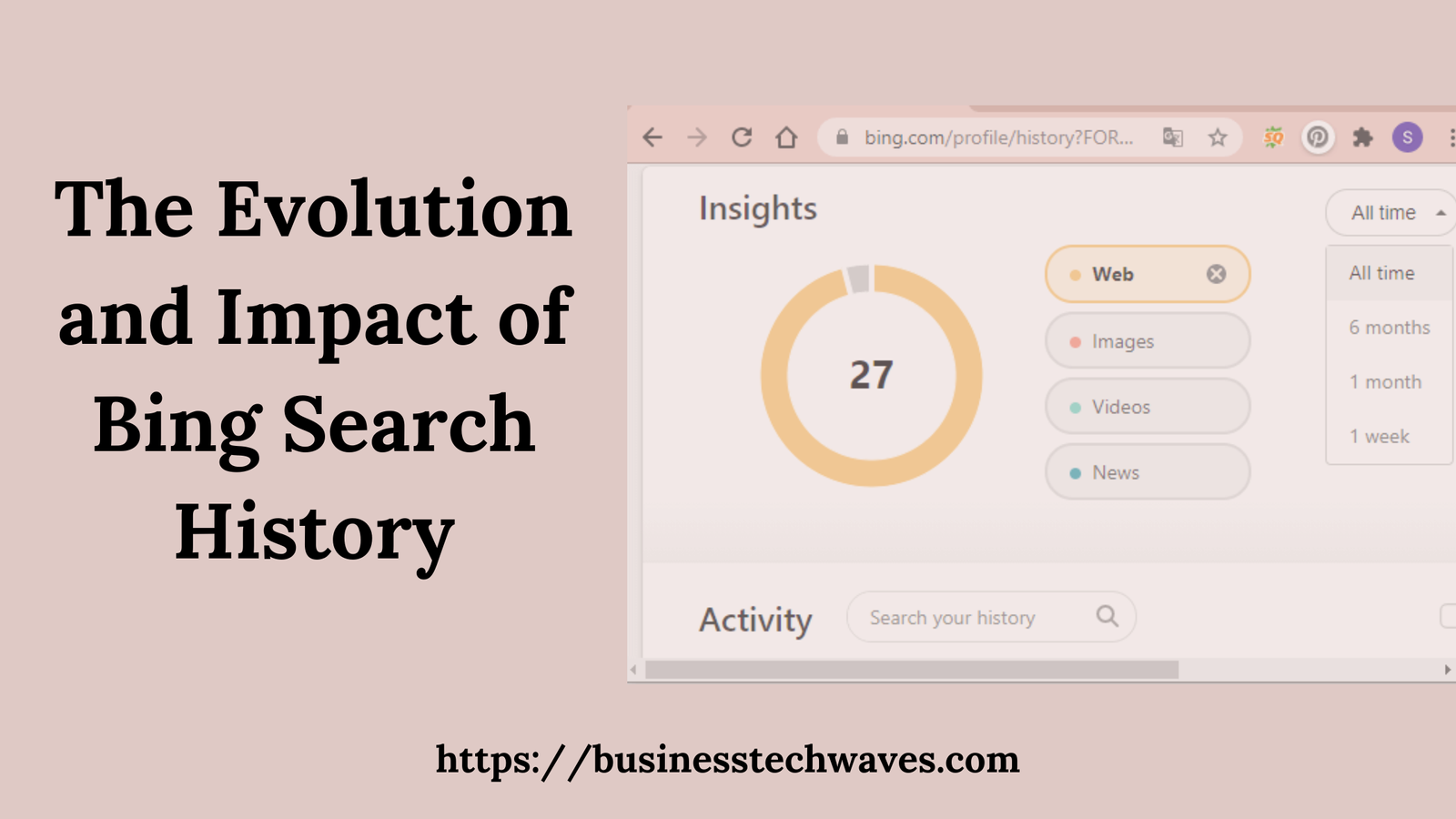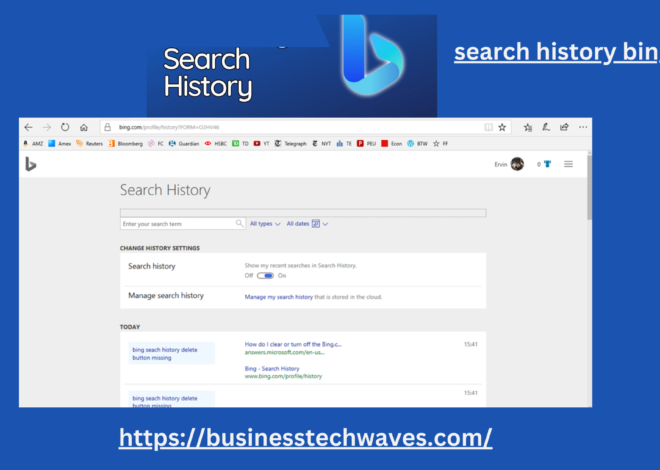
The Best Evolution and Impact of Bing Search History in 2024
Introduction
Search engines have become an integral part of our daily lives, serving as the gateway to the vast repository of information available on the internet. Among the various search engines, Bing, developed by Microsoft, has established itself as a significant player in the field. One of the most intriguing aspects of using search engines is the concept of search history, a feature that tracks the queries users make over time. Bing Search History, like its counterparts on other platforms, has evolved considerably, impacting both users and the broader digital landscape. This article delves into the history, functionality, and implications of Bing Search History.
The Genesis of Bing Search
Before diving into the specifics of Bing Search History, it’s important to understand the origins of Bing itself. Launched in 2009, Bing was Microsoft’s answer to the dominance of Google in the search engine market. Bing aimed to differentiate itself through innovative features, a user-friendly interface, and partnerships with other tech giants. Over the years, Bing has grown to become the second-largest search engine globally, with a significant user base that appreciates its unique offerings.
The Introduction of Search History
Search history is a feature that records the queries a user makes on a search engine, allowing them to revisit previous searches with ease. This functionality has been a part of most major search engines, including Bing, from the early stages of their development. The primary purpose of search history is to enhance user experience by providing quick access to past searches, thereby saving time and effort.
Bing’s Search History feature was introduced as part of its broader strategy to offer a personalized search experience. By storing a user’s search queries, Bing could provide more relevant results based on their search patterns and preferences. This feature also facilitated the integration of Bing with other Microsoft services, such as Outlook and Windows, further enriching the user’s experience across the ecosystem.
How Bing Search History Works
Bing Search History operates by recording the search queries made by users while they are logged into their Microsoft account. This data is stored in the cloud, making it accessible from any device where the user is signed in. The history is presented in a chronological format, allowing users to easily navigate through their past searches.
The functionality of Bing Search History is not limited to merely storing search queries. It also allows users to manage their history by deleting individual searches or clearing their entire history. Additionally, users can pause the recording of their search history if they prefer to search without leaving a trace.
Bing Search History also extends to voice searches made through Cortana, Microsoft’s virtual assistant. This integration allows users to access and manage voice search queries in the same way they would with text-based searches.
Benefits of Bing Search History
The primary benefit of Bing Search History is the convenience it offers users. By providing quick access to previous searches, users can easily revisit websites, articles, or other content without needing to remember exact search terms. This is particularly useful for ongoing research or when users frequently search for the same topics.
Another significant advantage is the personalization of search results. Bing uses search history to tailor results to individual users, increasing the relevance of the information provided. For example, if a user frequently searches for technology news, Bing might prioritize technology-related results in future searches.
Search history also plays a crucial role in the integration of Bing with other Microsoft services. For instance, Cortana can use search history to provide more accurate and contextually relevant answers to voice queries. Similarly, Bing-powered search features in Outlook or Windows can leverage search history to offer personalized recommendations or shortcuts.
Privacy Concerns and Management
Despite the benefits of Bing Search History, it also raises important privacy concerns. The recording of search queries means that a significant amount of personal information is stored on Microsoft’s servers. This data can potentially be accessed by unauthorized parties if proper security measures are not in place, leading to concerns about user privacy.
To address these concerns, Bing provides several tools for managing search history. Users can view and delete their search history at any time, giving them control over the data stored by Bing. The option to pause search history recording also allows users to search privately when needed.
Additionally, Microsoft has implemented robust security measures to protect user data. These include encryption, secure access controls, and regular audits to ensure that user information is safe from unauthorized access. Microsoft also adheres to strict privacy policies that govern how search history data is used, ensuring that it is not shared with third parties without user consent.
The Impact of Search History on User Behavior
Bing Search History has a profound impact on user behavior, particularly in terms of how users interact with the search engine. The convenience of having a searchable record of past queries encourages users to rely more heavily on the search engine for finding information. This increased reliance can lead to more frequent use of Bing, reinforcing its position as a valuable tool in the user’s digital life.
The personalization of search results, driven by search history, also influences user behavior. By presenting more relevant results, Bing can increase user satisfaction and engagement, making it more likely that users will return to the platform. This, in turn, can lead to increased brand loyalty and a larger user base for Bing.
However, the reliance on search history for personalization can also create a “filter bubble,” where users are only exposed to information that aligns with their previous searches. This can limit the diversity of information presented to users, potentially reinforcing existing biases and limiting their exposure to new perspectives.
The Future of Bing Search History
As technology continues to evolve, so too will the features and capabilities of Bing Search History. One area of potential growth is the integration of artificial intelligence (AI) and machine learning. These technologies could enable Bing to provide even more personalized search experiences by analyzing search history in greater depth and identifying patterns that were previously undetectable.
Another potential development is the increased focus on privacy and data security. With growing concerns about digital privacy, Bing may introduce new features that give users greater control over their search history and how it is used. This could include enhanced privacy settings, more transparent data usage policies, and additional tools for managing search history.
The integration of Bing Search History with emerging technologies, such as augmented reality (AR) and virtual reality (VR), is also a possibility. As these technologies become more prevalent, Bing could leverage search history to offer personalized AR or VR experiences, further enhancing the user’s interaction with digital content.
Conclusion
Bing Search History is a powerful feature that has significantly shaped the user experience on Microsoft’s search engine. By providing convenient access to past searches and enabling personalized search results, it has become an essential tool for users who rely on Bing for their information needs. However, it also raises important questions about privacy and the potential impact on user behavior. As technology continues to advance, the evolution of Bing Search History will likely reflect broader trends in digital privacy, personalization, and user engagement. Whether you’re a casual user or a digital enthusiast, understanding the implications of search history is crucial in navigating the ever-changing landscape of online information.


